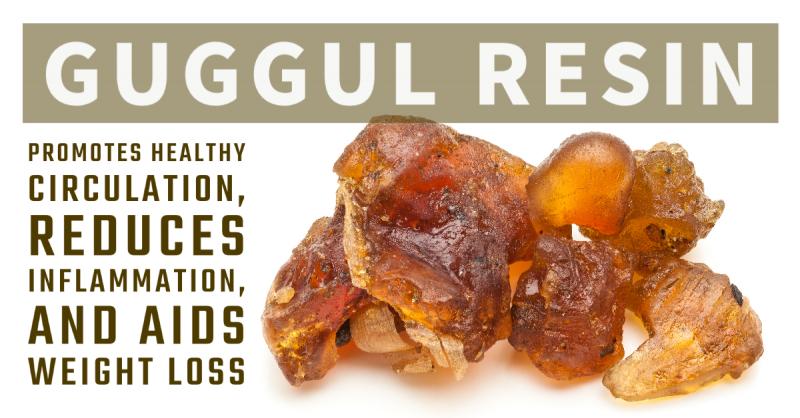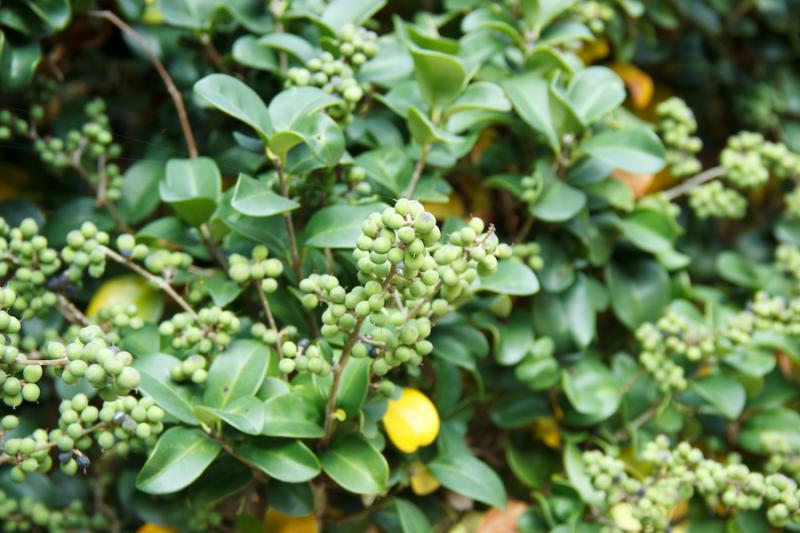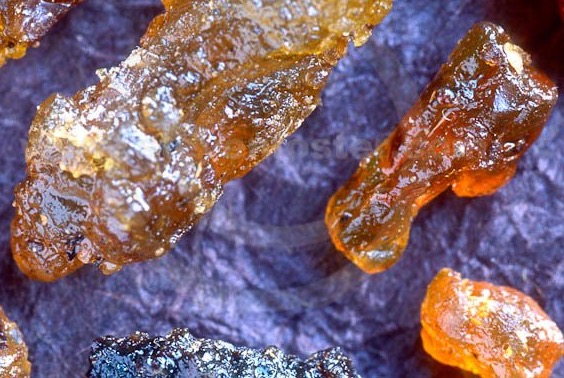
Guggul is derived from the resin of a small thorny tree called Commiphora wightii, also known as C. mukul. It's a relative of myrrh, C. myrrha. There are about eighty species in the Commiphora genus that grow from India to Greece, but these two are the most well-known. Both plants produce a resin that has been used both as a perfume or incense and as a medicine, but the focus of this article is guggul. You can read about myrrh in the article: A Bitter Perfume for the Darkest Time of the Year.
Guggul has a long history of use in India as an aid for weight loss, as an anti-inflammatory in arthritis rheumatism, and as a remedy for skin disorders such as acne. It has also been used for neurological diseases, hemorrhoids, and water retention.
Guggul for Circulation
Guggul is promoted in the West primarily as a remedy for helping to lower cholesterol and aid the circulatory system. It contains a steroid called guggulsterone, which inhibits cholesterol synthesis in the liver. In scientific studies, Guggul has demonstrated the ability to lower serum cholesterol by more than 20% without other dietary modifications. Guggul also lowers triglycerides and LDL, while raising HDL. Taking guggul produces no side effects and has no correlation to a person’s age, sex or weight. In spite of this promising research, it is uncertain whether guggul has the ability to lower cholesterol. In one study guggul raised LDL levels.
However, guggul does benefit the circulatory system in other ways. Guggul appears to have antiplatelet and anticoagulant activity, so it would inhibit the formation of blood clots in the circulatory system. Because of this, caution should be used when taking guggul with aspirin, NSAIDs, and blood thinners.
Clinical tests were performed on twenty patients who had hypercholesterolemia associated with obesity, ischaemic heart disease, hypertension and diabetes. Guggul was administered orally to the patients for thirty days. In every case a decline in total serum cholesterol and serum lipid-phosphorus was observed after using guggul during the 30-day period. Ten of the obese patients experienced a significant decline in body weight after using guggul, which brings us to another potential use for guggul—weight loss.
Guggul for Weight Loss
 A compound in guggul, called ushan virya, may stimulate the mobilization of fat stores throughout the body. Moving free fatty acids from fat tissue cells to muscle cells for energy increases the fat-burning potential, particularly during exercise. Recent studies indicate that guggul stimulates weight loss at the ideal pace of about one pound per week.
A compound in guggul, called ushan virya, may stimulate the mobilization of fat stores throughout the body. Moving free fatty acids from fat tissue cells to muscle cells for energy increases the fat-burning potential, particularly during exercise. Recent studies indicate that guggul stimulates weight loss at the ideal pace of about one pound per week.
Part of the reason why guggul may be helpful here is that it acts as a thyroid stimulant. It appears to increase the conversion of T4, the storage form of the thyroid hormone, into T3, the active form. This would increase metabolism and the burning of fat in the body, including helping to lower triglycerides.
Guggul for Inflammation and Infection
Guggul extracts have a definite anti-inflammatory action. A triterpene called myrrhanol A was discovered in guggul that has potent anti-inflammatory effects. It may also help to lower lipoprotein (a) and C-reactive protein, two blood factors known to have a link with inflammation and heart disease. Because of these benefits, it is clear that guggul can be a valuable aid in preventing heart disease and can also be helpful in arthritis and other diseases involving chronic inflammation.
Myrrh has a definite disinfectant action and it appears that guggul has antibacterial action as well. Guggul’s activity against acne was comparable to tetracycline. It decreased the inflammation in acne and decreased relapses in those who used it. It reduces the secretion of sebum and inhibits bacteria from metabolism the fats (triglycerides) in the oil ducts.
Other Uses for Guggul
 Guggul, myrrh, frankincense, and pine gum, are all hardened sap (known as gums or resins). They are produced when the tree is injured and form a natural protective barrier, sort of like a tree bandage. All of these substances appear to benefit human skin when it is damaged as well. They can be applied topically to wounds and inflamed skin to fight infection, reduce inflammation, and speed healing.
Guggul, myrrh, frankincense, and pine gum, are all hardened sap (known as gums or resins). They are produced when the tree is injured and form a natural protective barrier, sort of like a tree bandage. All of these substances appear to benefit human skin when it is damaged as well. They can be applied topically to wounds and inflamed skin to fight infection, reduce inflammation, and speed healing.
Like myrrh, guggul also acts as a bitter digestive stimulant. It promotes the production of hydrochloric acid and enzymes, which aids the digestion and assimilation of nutrients. So, although it is not a typical ingredient in bitter digestive tonics, it could be used in them.
Guggul has also been reported to remove deep-seated toxins from the body's soft tissues. Toxins can accumulate in and around the joints, causing joint pain, arthritis, muscle aches, and rheumatism. Guggul lipids may be able to bind to these toxins and remove them through the bloodstream.
Downloads
Steven's Articles
-

-
Eucommia Bark
A superior tonic that promotes kidney, structural,…
January
-

-
Goldenthread, Phellodendron, and Yellow Root
Three herbal remedies containing the infection-fighting…
-

-
Teasel
A traditional herb for healing bones and joints…
-

-
Barberry and Healthy Personal Boundaries
A thorny shrub for fighting infections and supporting…
December
-

-
The Evidence for Berberine
A yellow alkaloid found in traditional infection-fighting…
-

-
The Sensible Use of Caffeinated Herbs
Kola nuts, guarana, and yerba mate and other herbs…
-

-
The Health Benefits and Problems with Coffee
This popular caffeinated beverage can be beneficial…
October
-

-
Understanding Caffeine & Cellular Adaptation
Preserving the power of caffeine's buzz and the…
September
-

-
Horseradish
A pungent spice for aiding protein metabolism…
-

-
Banaba or Crepe Myrtle
A beautiful tree from Southeast Asia whose leaves…
August
-

-
Monkeyflowers
Flower essences to help see ourselves more clearly…
-

-
Mariposa Lilies
Strengthening the bond between mother and child…
-

-
The Noble Bay Leaf
A common kitchen herb for aiding digestion and…
-

-
Epimedium: Horny Goat Weed
A circulatory stimulant and kidney yang tonic…
July
-

-
The Medicinal and Nutritional Benefits of Apricots
A nutritious fruit and valuable medicinal seed for coughs

